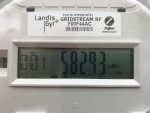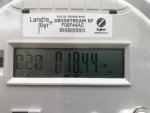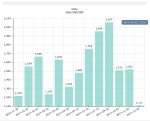- 2,543
- 2,094
- 113
- Location
- Efland, NC
A few months ago my power company installed a new power meter on my house. One of those "smart" meters. As far out in the woods as I am, I'm not far enough! They finally caught up to me. 
I already had a pretty good handle on my power usage using amp and power meters. I was curious to see how the smart meter compared to my own measurements. After downloading a months of data and putting it into a spreadsheet I can see that the data compares very well with my own measurements.
Downloading the data in its most granular form allows for an hourly view of the home's energy consumption. Overall I can see that the average is about 0.3kwh on the low side and between 1-2kwh when normal life is happening around the house. I can see higher usage that goes with running the dryer and the oven. .Since my water heater is on a timer to run twice a day I can see those bumps up in the morning and the evening when it kicks on (when the sun wasn't enough to heat the water).
My point is this - you may have a valuable tool to help you understand your energy usage. Its not going to tell you any instantaneous loads such as what happens when your AC unit starts or when your HP does a defrost and runs the heat strips. BUT it can help you understand your "area under the curve" usage which will give you valuable information in regards to the proper sizing of a generator. Using my data as an example when I chart the MAX hourly captured kwh it is rarely over 5kwh. Using this data and assuming that I don't have something with a huge short term load it looks like the best fit for my house is a MEP802. I can confirm this in practice since I've shown that a MEP802 will indeed run my house perfectly well and start the 3T HP without any issues. Some load management is necessary to not do things such as run the dryer at the same time you are expecting the AC/Heat to run. Also I've put the heat strips for my HP on its own breaker that stays off most of the time.
Sorry for all the rambling but I just wanted to point out that if you have a smart meter on your house you may have a good starting point for data to help you decide how much generator you need. You may even see some opportunities to cut back if you aren't careful.
I made a screen shot of the spreadsheet. Since the forum limits the size of the images its impossible to read it if I upload it here. I've shared it from google. You can check it out here if you are interested - https://drive.google.com/open?id=1KPeE1Y576WGmGlr7408CIjGXteOSOWLz
I already had a pretty good handle on my power usage using amp and power meters. I was curious to see how the smart meter compared to my own measurements. After downloading a months of data and putting it into a spreadsheet I can see that the data compares very well with my own measurements.
Downloading the data in its most granular form allows for an hourly view of the home's energy consumption. Overall I can see that the average is about 0.3kwh on the low side and between 1-2kwh when normal life is happening around the house. I can see higher usage that goes with running the dryer and the oven. .Since my water heater is on a timer to run twice a day I can see those bumps up in the morning and the evening when it kicks on (when the sun wasn't enough to heat the water).
My point is this - you may have a valuable tool to help you understand your energy usage. Its not going to tell you any instantaneous loads such as what happens when your AC unit starts or when your HP does a defrost and runs the heat strips. BUT it can help you understand your "area under the curve" usage which will give you valuable information in regards to the proper sizing of a generator. Using my data as an example when I chart the MAX hourly captured kwh it is rarely over 5kwh. Using this data and assuming that I don't have something with a huge short term load it looks like the best fit for my house is a MEP802. I can confirm this in practice since I've shown that a MEP802 will indeed run my house perfectly well and start the 3T HP without any issues. Some load management is necessary to not do things such as run the dryer at the same time you are expecting the AC/Heat to run. Also I've put the heat strips for my HP on its own breaker that stays off most of the time.
Sorry for all the rambling but I just wanted to point out that if you have a smart meter on your house you may have a good starting point for data to help you decide how much generator you need. You may even see some opportunities to cut back if you aren't careful.
I made a screen shot of the spreadsheet. Since the forum limits the size of the images its impossible to read it if I upload it here. I've shared it from google. You can check it out here if you are interested - https://drive.google.com/open?id=1KPeE1Y576WGmGlr7408CIjGXteOSOWLz






